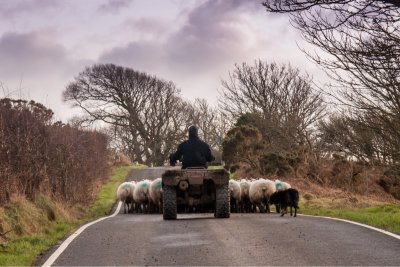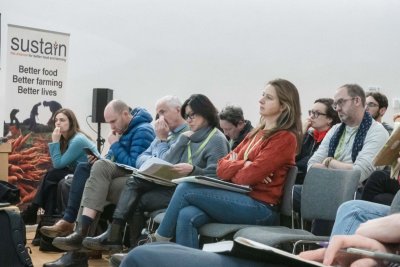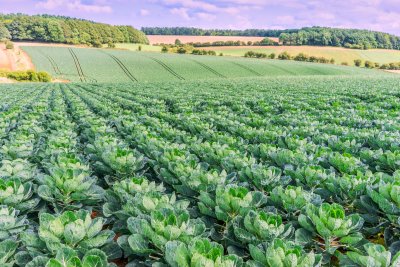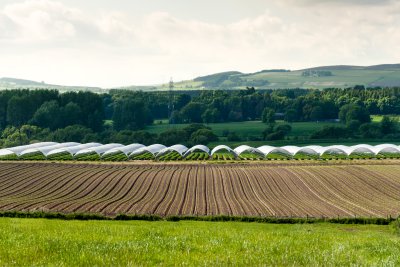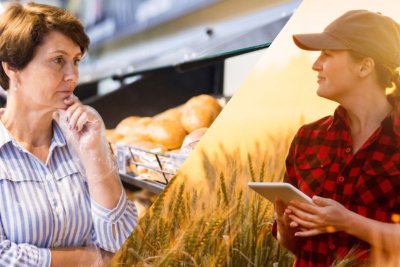 New report by Sustain looks at supply chain fairness. Credit: Shutterstock
New report by Sustain looks at supply chain fairness. Credit: Shutterstock
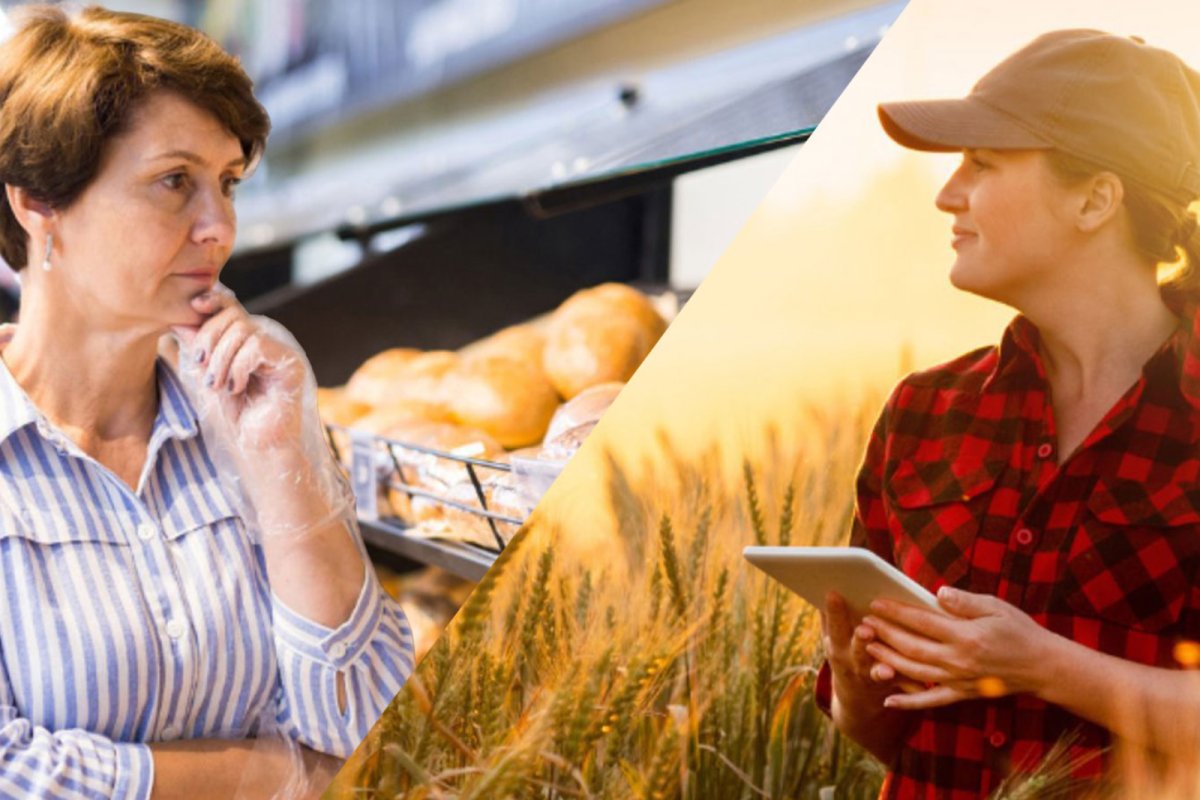
Unpicking food prices: Where does your food pound go, and why do farmers get so little?
Farmers often left with less than 1p of food profits for their produce, reveals new Sustain report.
UK farmers are often left with far less than 1p profit from the food items they produce, a new report from Sustain has revealed. Sustain looked at five everyday amounts of food stuffs - apples, cheese, beefburgers, carrots, and bread - and found that, after intermediaries and retailers take their cut, farmers are sometimes left with far less 1% of the profit.
For example, for a wrapped, sliced loaf of bread, the cereal farmer spends 9.03p yet receives an almost negligible profit (0.09p) on a selling price of £1.14, but for a loaf of Real Bread sold in an independent bakery they make 0.5p profit. For 4 beefburgers the processor gains ten times the profit of the beef farmer. A carrot grower spending 14p per bag and selling to the supermarket supply chain gets almost negligible returns. (see note 4 for more results and the report).
The report “Unpicking Food Prices: Where does your food pound go and why do farmers get so little?” (1) examines where the money spent on the five everyday food products goes and why that matters. In the report, the researcher details the typical costs and profits allocated to each part of the chain from farmer/grower, through intermediaries and processors to the retailers.
Despite battling extreme weather events like flooding and drought and facing soaring energy and production costs, this work suggests farmers received less than 1% of profits if supplying a supermarket chain. Instead, profits are directed to intermediaries like processors, transport companies and retailers. By contrast, in shorter chains run by social enterprises like vegetable box schemes and co-ops, more value reached farmers and their workers.
The charity is calling on government to beef up supply chain regulations making them fairer for farmers, for regional structural funds to invest in more infrastructure like hubs and local processing that could shorten chains, getting more value to the farmers, and for more transparency in food chains. Debates on farm policy, which put environmental aims at the forefront of targets, largely ignore how the money is allocated in supply chains. That needs to change.
Vicki Hird, Head of Farming at Sustain (2) said:
“It is astonishing how little of the money we pay for our food ends up in the hands of the farmers and growers. Farmers carry a lot of risk and work in difficult conditions to put food on our table. We also expect them to look after our landscape and our nature – and want them to do more of that in the future including protecting nature and helping to cut 30% of food based climate changing greenhouse gas emissions. If they are to do that, they need more money in their businesses. That money should not leach out of the system into the coffers of food industry intermediaries and supermarkets.
If we’re to give our farmers the chance to change how we produce food, they need to keep more of the value so they can invest and use new approaches. We should not let intermediaries and food buyers hold all the bargaining chips. Crucially, our report shows that paying farmers more need not mean higher food prices so retailers cannot use that excuse - there would be little impact on many products’ retail prices if farmers were paid more. We make strong recommendations on investing in better routes to market, regulating all supply chains, and building transparency.”
Farmers look after 70% of UK land and so need to protect nature and soils and tackle climate change whilst growing food, making a living and looking after workers. Yet they will struggle to do so when the market fails to reward good practice, their costs are rising whilst income support from government is ending with new support for delivering public goods not yet fully in place. Sustain has detailed recommendations for Government including:
- Tougher regulation is needed to help redress the imbalance of power between farmers, processors and the supermarkets including maintaining the Groceries Code Adjudicator, introducing new, legally binding, sectoral supply chain codes of practice, better labelling to ensure transparency and planning rules to curb local retail dominance.
- Building new better routes to market for farmers - so they have more power and gain greater value from their produce - through an action plan to increase the market share of shorter and farmer-focused supply chains, public investment in localised agri-food infrastructure (such as sorting, drying, hubs) and enterprise and using dynamic public procurement models to source from a large range of farmers and growers.
- More transparency in supply chains, greater mandatory reporting and acknowledge the huge overheads in the current, complex system
Alongside the vital changes to the supply chain and market policies above, we need the new forms of public farm support, as soon as possible, accessible for all farmers and with a multiannual budget to fit the scale of need to protect nature, tackle climate and ensure healthy, affordable food is produced here.
The report’s researcher Professor Lisa Jack, University of Portsmouth, notes
“Our food systems have very high production and overhead costs, yet what profits there are, could be shared more fairly along the supply chain, supporting not just affordable food but better incomes for those working in the industry”.
Additional researcher Harriet Hammans of City, University of London notes that
“Three times more of your food pound goes to farmers with every purchase you make from your local Better Food Trader or not-for-profit food hub. Farmers make more money selling into this transparent, ecological supply chain to invest in their sustainable, organic businesses - which are the future of farming and our countryside. Your money also goes towards paying staff who work so hard in the supply chain more fairly, and supporting an innovative, socially conscious trader which has the potential to scale up in the future.”
Contact Vicki Hird 07903478249 vicki@sustainweb.org James Woodward James@sustainweb.org Professor Lisa Jack Can be contacted via Sustain.
Notes
1. The full report is available to download https://www.sustainweb.org/publications/dec22-unpicking-food-prices/. The main research by Professor Lisa Jack of Portsmouth University (Professor of Accounting, Faculty of Business & Law, School of Accounting, Economics and Finance) with Harriet Hammans, Research Officer at City, University of London’s Food Research Collaboration and additional text and conclusions and recommendations by the Sustainable Farming team, Vicki Hird, James Woodward, of Sustain.
2. Sustain is a powerful alliance of over 110 organisations and communities working together for a better system of food, farming and fishing, and cultivating the movement for change. www.sustainweb.org
3. Note the data sets were largely taken from aggregated industry and official sources from before the Ukraine invasion to avoid the spikes in energy costs etc and are indicative of the supply chain costs and profits.
4. Key findings The analysis showed that for 5 main food items the industry and government data suggested,
- For a 480g pack of mild cheddar purchased in a supermarket the dairy farmer costs are £1.48 yet receives in profit 0.02% (0.05p) of the selling price of £2.50.
- For a 350g four-pack of supermarket beefburgers for £3.50, the beef farmer has high costs of 90p, yet receives in profit 0.03% (0.1p), and far less that the processor who has similar costs and yet gets ten times the profit (1p) and retailer 70 times (7p).
- For a loaf of bread, the cereal farmer spends 9.03p yet receives an almost negligible profit on a selling price of £1.14.
- For 1kg of apples purchased in a supermarket (about 6 apples), the apple grower has costs of 76p, yet receives in profit just 1% (3 pence) of a selling price of £2.20. From a non profit hub, 1kg of organic apples purchased gives the organic apple grower three times -3% (10 pence) of the selling price of £4.00 with costs of 175p.
- For 1kg of supermarket carrots the grower has costs of 14p, yet receives negligible profit on a selling price, with prices so low that margins across the carrot supply chain are tiny. When purchased in a not-for-profit food hub, the carrot grower has receives in profit 3% (5 pence) i.e. a higher and more realistic return for the higher costs of organic growing and a better proposition for the growers.
Sustainable Farming Campaign: Pushing for the integration of sustainable farming into local, regional and national government policies.
Sustain
The Green House
244-254 Cambridge Heath Road
London E2 9DA
020 3559 6777
sustain@sustainweb.org
Sustain advocates food and agriculture policies and practices that enhance the health and welfare of people and animals, improve the working and living environment, promote equity and enrich society and culture.
© Sustain 2026
Registered charity (no. 1018643)
Data privacy & cookies
Icons by Icons8
